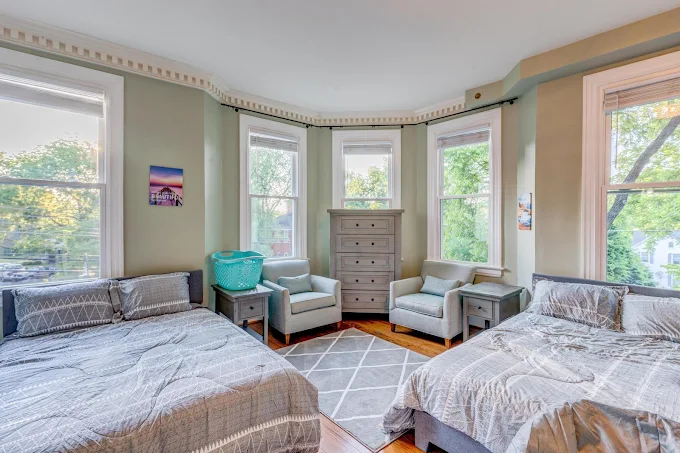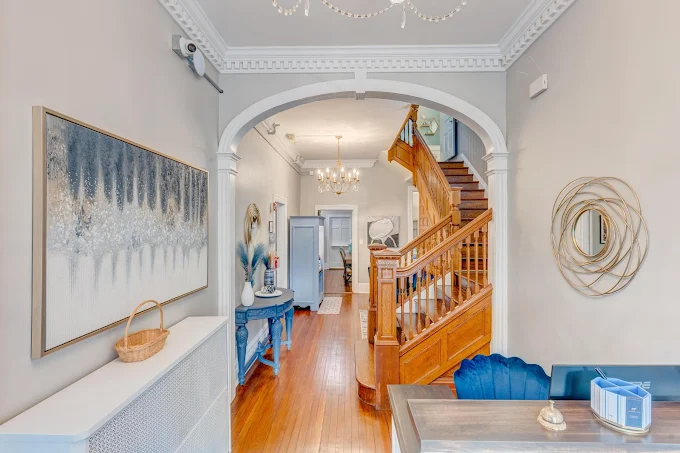Home / Buckeystown
Buckeystown Treatment Facility
Our Buckeystown treatment facility provides a peaceful and supportive environment to help people struggling with addiction begin their journey toward recovery. At The Freedom Center, we provide a full continuum of inpatient care in a calm, restorative setting for those seeking help with substance use and co-occurring disorders.
The Freedom Center Maryland Drug & Alcohol Rehab
Tour The Facility





About Our Buckeystown Location
Intensive Inpatient Treatment
A highly structured program that provides 24/7 care, intensive therapy, and round-the-clock support in a residential setting.
Inpatient Residential Treatment
Residential care with a less-intensive focus, offering continued therapeutic support, peer connection, and preparation for the next phase of recovery.
Therapy and Programs We Offer
We utilize a wide range of evidence-based therapies and holistic approaches, tailored to meet the unique needs of each individual. Our treatment modalities and specialty programs include:
Individual therapy
One-on-one therapy provides personalized treatment for addiction by addressing the root causes of substance abuse. Our therapists use evidence-based techniques to help patients understand their behavioral patterns, identify triggers, set recovery goals, and learn coping skills.
Group therapy
Fosters a sense of community and shared experiences among individuals, promoting recovery. It provides peer support, accountability, and the opportunity to learn from others facing similar challenges and experiences. Group sessions often follow structured topics, such as relapse prevention, stress management, and emotional regulation.
Family therapy
Addiction affects not just the patient but the people who love them. Family therapy helps to rebuild the relationships damaged by addiction, nurture trust, address enabling behaviors, and improve communication to develop a strong foundation for the future.
Cognitive behavioral therapy
CBT is a widely used therapeutic approach that helps patients recognize and change negative thought patterns that may contribute to substance use. It focuses on practical skills to handle stress, manage cravings, and prevent relapse by reshaping how the patient responds to them.
Dialectical behavior therapy
DBT emerged as a treatment for borderline personality disorder, but it’s proven effective in addiction treatment by focusing on distress tolerance, mindfulness, and emotional regulation that can help patients manage the intense emotions they experience and develop healthier coping strategies.
Eye movement desensitization and reprocessing (EMDR)
EMDR is an evidence-based approach to processing and healing from traumatic memories that may be driving substance use or mental health struggles.
12-Step groups
12-Step groups rely on the principles of Alcoholics Anonymous (AA) to provide structured, peer-supported recovery with an emphasis on acceptance, accountability, and spiritual or personal growth.
SMART Recovery
SMART Recovery is a science-based program that empowers individuals to manage their recovery by building skills for motivation, behavioral change, and self-management.
Gender-specific groups
Our gender-specific groups provide safe spaces for men and women to address the issues and challenges unique to their experiences with addiction and recovery.
Dual diagnosis treatment
Dual diagnosis treatment provides integrated care for individuals dealing with both substance use and co-occurring mental health conditions like anxiety or depression that may complicate addiction recovery.
Holistic therapy
Holistic therapy encompasses whole-person approaches, including mindfulness, meditation, nutrition, and exercise, to support physical, emotional, and spiritual well-being.
Yoga therapy
Yoga therapy combines movement, breathwork, and mindfulness to promote relaxation, reduce stress, and improve physical and mental well-being.
Art therapy
Art therapy uses creative expression through art to explore emotions, improve self-awareness, and support emotional healing in recovery.
Music therapy
Music therapy incorporates music listening, creation, and discussion to help with stress reduction, processing feelings, and fostering emotional connection.
Daily Routine at Buckeystown
A typical day at the Buckeystown, Maryland, facility includes morning wellness checks, group or individual therapy, community activities, and time for rest and reflection. Patients enjoy nutritious meals, outdoor recreation, and supportive activities, such as fireside gatherings. Our structured daily schedule is designed to help patients focus fully on recovery, free from the distractions of daily life.

Benefits of Inpatient Rehab
Inpatient drug rehab is designed to provide support to patients to help them overcome addiction and immerse themselves in their treatment program without distractions or daily stress.[1] Some key benefits of inpatient rehab include:
A Structured and Supportive Environment
Inpatient rehab nurtures routine in a safe and substance-free setting with others going through similar struggles. Without daily triggers and distractions, patients can focus on the tasks necessary for their recovery.
Mental Health and Dual Diagnosis Support
Inpatient rehab can be the ideal setting for patients struggling with co-occurring mental disorders like anxiety, depression, or PTSD that may complicate addiction treatment.
Peer Support and Community
Inpatient rehab encourages accountability through group interactions in a communal environment. Patients often form meaningful, long-term friendships with others in recovery, which can aid them as they transition into everyday life.
24/7 Medical and Emotional Support
Inpatient rehab provides 24/7 support and access to medical professionals to assist with prolonged withdrawal symptoms or medical challenges that affect recovery. There are always therapists and counselors available for emotional support, which is crucial in the early stages of recovery.
Intensive Therapy and Counseling
Inpatient rehab includes a range of therapies based on the patient’s treatment plan, such as group therapy for peer support, individual therapy, behavioral therapy to address the unhelpful behaviors that contribute to substance abuse, and family therapy to repair relationships that may have been harmed by addiction.
Are Inpatient Rehab Programs Effective?
Residential addiction treatment can be effective for patients who need 24/7 support and supervision. Studies suggest that inpatient care can have a positive impact on substance use recovery and quality of life, including a lower risk of relapse, longer periods of abstinence after rehab, and relief from co-occurring mental health conditions like anxiety and depression.[2]
Though different settings may be more successful for other patients, residential treatment can be a crucial aspect of the continuum of care due to its comprehensive and immersive environment that builds a strong foundation in the early, vulnerable stages of addiction recovery.
Start Recovery Today
Contact our admissions team to explore our comprehensive inpatient programs and personalized therapies. We’re ready to help with the next steps.
Frequently Asked Questions About Our Buckeystown Treatment Center
Drug and alcohol rehab in an inpatient setting can vary in length of stay based on the patient’s needs and treatment plan, individual progress, and severity of addiction. However, the average length of stay for inpatient rehab in our Buckeystown location is 21 days.
The key difference between inpatient and outpatient drug addiction treatment is the residential aspect. With inpatient treatment, patients reside at the location for a specific period, which is typically a few weeks. In contrast, outpatient treatment offers flexibility for clients to live at home and tend to their responsibilities while balancing addiction recovery. Inpatient treatment is preferred for patients who lack a supportive home environment and benefit from the structured environment.
Patients may be allowed family visits during designated times during inpatient rehabilitation, depending on their treatment plan. Family involvement can be a crucial part of recovery, notably through family therapy sessions that focus on family dynamics and provide support.
Once inpatient rehab is complete, patients may continue with outpatient treatment and similar therapies on a less-rigorous schedule, sober living homes, or aftercare programs that support long-term recovery. Continued therapy, support groups, and relapse prevention strategies are essential for long-term success.
Many insurance providers offer coverage for addiction treatment, including major providers. If patients lack adequate coverage, the Freedom Center provides flexible payment options to accommodate different financial situations. We understand that costs can be a barrier to people seeking treatment and do all that we can to make recovery accessible to those who need it most.
Inpatient treatment at the Freedom Center takes place in an open rehab center. Patients are free to leave, but are required to remain on site for their treatment to avoid any risks of relapse or hindering their progress.
Cell phones are generally not allowed in residential treatment facilities due to privacy laws that protect the rights of other patients. Laptops are generally not allowed in residential treatment, but there may be exceptions for extenuating circumstances.
Inpatient treatment at our recovery center does not offer private rooms, but patients stay in semi-private rooms with one or two other patients.
Each addiction treatment center has different rules for patients in residential treatment. Typically, these rules are centered around accountability and supporting recovery, such as attending required therapy sessions, being punctual, and not engaging in any substance use or violence on the property.
Sources
[1] Institute of Medicine (US) Committee for the Substance Abuse Coverage Study. (1990, January 1). The effectiveness of treatment. Treating Drug Problems: Volume 1: A Study of the Evolution, Effectiveness, and Financing of Public and Private Drug Treatment Systems. Retrieved from https://www.ncbi.nlm.nih.gov/books/NBK235506/ on 2025, April 3.
[2] Bergman, B. G., Davis, J. P., Drake, R. E., Eastwood, B., Lloyd, B., Myers, B., Schuman-Olivier, Z., Willey, H., Babaie, E., Borkman, T., Brunette, M. F., Cleary, M., Cutcliffe, J. R., Daughters, S. B., … King, J. (2019, June 20). The effectiveness of residential treatment services for individuals with Substance Use Disorders: A systematic review. Drug and Alcohol Dependence. Retrieved from https://www.sciencedirect.com/science/article/abs/pii/S0376871619301875 on 2025, April 3.



































